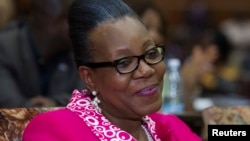BANGUI, CAR —
The Central African Republic has a new interim president, Catherine Samba-Panza, elected Monday by members of the country’s transitional parliament. She represents a break with the past in more ways than one.
On Sunday, the election bureau of the parliament whittled down a list of 24 would-be candidates to just eight, and on Monday the lawmakers held a very public election attended by media and numerous other observers.
Bangui Mayor Samba-Panza is a relative newcomer to politics, and now the country’s first female president.
In her election address she used a pun on her title of "mayor" to full effect - mayor meaning both the elected head of a municipality and mother, in French, the Central African Republic’s official language.
She told parliamentarians, “I have been the mayor [or mother] who is close to the population, and if you think I can be the mother who can bring people together, the mother who can relieve the sufferings of this country’s children and the mother who will fight to bring the CAR out of chaos, then brother and sisters vote for me."
Her main opponent Desire Kolingba, the son of former president Andre Kolingba, offered to give his election address in the local language Sango, perhaps to emphasize his 100 percent Central African origins, although nationality does not appear to have been an issue for candidates in this election.
He gave a subdued speech calling for unity.
The final election result was drowned out by cheering. That was 75 votes for Samba- Panza and 53 for Desire Kolingba.
The International Crisis Group’s Central Africa analyst, Thierry Vircoulon, said that Samba-Panza has spent most of her career in the private sector, but has impressed observers with her seriousness as mayor since her appointment last year. He suggested that her election as interim president will be widely popular.
"Basically, this is maybe what the people of Bangui wanted, but above all it is what the international community wanted - a new face as president," said Vircoulon.
Samba-Panza is due to serve until national elections can be organized. The U.S. government has called for elections to be held by February of next year.
The current violence afflicting the CAR makes an immediate election virtually impossible.
On Sunday, the election bureau of the parliament whittled down a list of 24 would-be candidates to just eight, and on Monday the lawmakers held a very public election attended by media and numerous other observers.
Bangui Mayor Samba-Panza is a relative newcomer to politics, and now the country’s first female president.
In her election address she used a pun on her title of "mayor" to full effect - mayor meaning both the elected head of a municipality and mother, in French, the Central African Republic’s official language.
She told parliamentarians, “I have been the mayor [or mother] who is close to the population, and if you think I can be the mother who can bring people together, the mother who can relieve the sufferings of this country’s children and the mother who will fight to bring the CAR out of chaos, then brother and sisters vote for me."
Her main opponent Desire Kolingba, the son of former president Andre Kolingba, offered to give his election address in the local language Sango, perhaps to emphasize his 100 percent Central African origins, although nationality does not appear to have been an issue for candidates in this election.
He gave a subdued speech calling for unity.
The final election result was drowned out by cheering. That was 75 votes for Samba- Panza and 53 for Desire Kolingba.
The International Crisis Group’s Central Africa analyst, Thierry Vircoulon, said that Samba-Panza has spent most of her career in the private sector, but has impressed observers with her seriousness as mayor since her appointment last year. He suggested that her election as interim president will be widely popular.
"Basically, this is maybe what the people of Bangui wanted, but above all it is what the international community wanted - a new face as president," said Vircoulon.
Samba-Panza is due to serve until national elections can be organized. The U.S. government has called for elections to be held by February of next year.
The current violence afflicting the CAR makes an immediate election virtually impossible.








